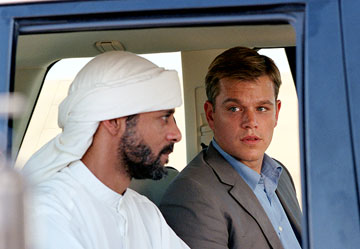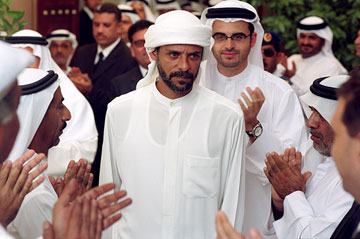|
|
Syriana
Directed by Stephen Gaghan
 Syriana is an intelligent, thought-provoking film floating in a market dominated by silliness. The subject is the oil business and the politics attached to it. That’s the good news – which should be more than enough to convince you to see it. The bad news: the stories (there are four – one of which is a dud – three are compelling) are told from an anti-business/anti-American point of view. Now, while I disagree with director Stephen Gaghan’s opinions, I still admire his ability to create an engaging and interesting tale of oil, politics and (huge) money. While the movie is loosely based on a supposedly non-fiction book (See No Evil: The True Story of a Ground Soldier in the CIA's War on Terrorism by Robert Baer), the characters and situations depicted are fictional – keep that in mind – let the film stimulate your thought processes but please don’t accept its point of view uncritically. Syriana is an intelligent, thought-provoking film floating in a market dominated by silliness. The subject is the oil business and the politics attached to it. That’s the good news – which should be more than enough to convince you to see it. The bad news: the stories (there are four – one of which is a dud – three are compelling) are told from an anti-business/anti-American point of view. Now, while I disagree with director Stephen Gaghan’s opinions, I still admire his ability to create an engaging and interesting tale of oil, politics and (huge) money. While the movie is loosely based on a supposedly non-fiction book (See No Evil: The True Story of a Ground Soldier in the CIA's War on Terrorism by Robert Baer), the characters and situations depicted are fictional – keep that in mind – let the film stimulate your thought processes but please don’t accept its point of view uncritically.
One of the four story lines centers on an energy-industry consultant (Matt Damon) who, due to a tragic accident resulting in the death of his son, gets close to a major player in the world oil market, a prince in an unnamed Persian Gulf state. Writing, direction and acting came together for one of the most compelling portraits of a young, intelligent businessman in memory – very few actors could have pulled this off – Matt Damon deserves special mention for his highly articulate, focused performance in a role that Hollywood almost always dumbs down. His client, call him the “good prince” (played with elegant restraint by Alexander Siddig) is
Western-educated, compassionate, and desirous of democratic reforms for his country.
 But guess what… in the world according to Mr. Gagham, the U.S. government wants to assassinate the good prince. OK, he opposed American military bases in his country – but again, why? And why wouldn’t he want America as a strategic ally since he shares American values? And the idea that the C.I.A. would work to kill (in an obviously traceable way) such a potentially valuable ally is absurd. In spite of that, this story is very intelligent, stimulating stuff.
But guess what… in the world according to Mr. Gagham, the U.S. government wants to assassinate the good prince. OK, he opposed American military bases in his country – but again, why? And why wouldn’t he want America as a strategic ally since he shares American values? And the idea that the C.I.A. would work to kill (in an obviously traceable way) such a potentially valuable ally is absurd. In spite of that, this story is very intelligent, stimulating stuff.
The “dud” story line (should have been cut if they couldn’t fix it) concerns a young Pakistani oil worker (Kayvan Novak) in the (same, still unmanned) Persian Gulf state who, after being fired and generally treated badly, turns to an Islamic fundamentalist mentor who coaches him and eventually turns him into a potential suicide bomber. I found the transformation totally unconvincing. I start from the premise that all human beings have an innate aversion to self-destruction – so to create a suicide bomber out of a mentally healthy, if somewhat angry and frustrated man is very difficult – the story in the film makes it seem too simple. If you want to see a very scary portrait of a couple of suicide bombers, check this out:
IMDB link for Paradise Now.
I found that film so terrifyingly pessimistic that I wouldn’t want to sit through it again and hesitate to recommend it -- it’s extremely strong stuff.
 George Clooney stars as Robert Barnes, a C.I.A. agent who gets unknowingly forced into a couple of dangerous situations – in one he’s directed to set up the assassination of the good prince (who he doesn’t know well at the time) and gets into a horrible predicament, threatening him physically and legally. As a veteran covert operative, he can maneuver skillfully both in D.C. and in the mid-East. He has as a state-side advisor a semi-retired operative (a calm, soft-spoken William Hurt) – their conversations help to keep the viewer grounded in what’s really happening – in other stories as well as this one. The Barnes character is presumably based on real-life operative Robert Baer, who wrote the book after retiring from the C.I.A. Again, certain events in the film are clearly fictional – if Baer had resolved his dilemma as described – and then written a book about it – he would have been exposed to criminal prosecution, which did not happen in real life. Despite these obvious variations from what’s real, it comes across as realistic. That makes for a stimulating film – just bear in mind that it’s fiction. George Clooney stars as Robert Barnes, a C.I.A. agent who gets unknowingly forced into a couple of dangerous situations – in one he’s directed to set up the assassination of the good prince (who he doesn’t know well at the time) and gets into a horrible predicament, threatening him physically and legally. As a veteran covert operative, he can maneuver skillfully both in D.C. and in the mid-East. He has as a state-side advisor a semi-retired operative (a calm, soft-spoken William Hurt) – their conversations help to keep the viewer grounded in what’s really happening – in other stories as well as this one. The Barnes character is presumably based on real-life operative Robert Baer, who wrote the book after retiring from the C.I.A. Again, certain events in the film are clearly fictional – if Baer had resolved his dilemma as described – and then written a book about it – he would have been exposed to criminal prosecution, which did not happen in real life. Despite these obvious variations from what’s real, it comes across as realistic. That makes for a stimulating film – just bear in mind that it’s fiction.
 The fourth, and my favorite story of the four concerns a bright young attorney in one of D.C.’s most powerful law firms. Bennett Holiday, played with focused precision by Jeffrey Wright, has a tiger by the tail: his client is a huge American oil company that’s trying to win approval to merge with a ethically questionable oil company in Kazakhstan. The trouble is that the Kazak company may have engaged in bribery to obtain the oil leases which make it so desirable. Bennett Holiday’s mission is to do what is necessary to make the deal happen – even if that means that some of his client’s executives have to be thrown to the wolves. If they knew about the bribery, they’ll have to do some time. This story is so complex that it could have been a 90-minute movie on its own. I love how all of the sophisticated players jockey for position. But again, the filmmakers’ bias comes into play: the American company is portrayed as nasty and corrupt. In one a ridiculous but beautifully delivered speech, an oil executive (Tim Blake Nelson) praises corruption. The problem with that is that American executives are forced, under threat of criminal prosecution, to play by a much more restrictive set of rules than their foreign competitors. If an American exec gets caught bribing (or even knowing about the bribe) to land a deal, he can go to jail – very few countries have those laws, putting American companies at a competitive disadvantage. The fourth, and my favorite story of the four concerns a bright young attorney in one of D.C.’s most powerful law firms. Bennett Holiday, played with focused precision by Jeffrey Wright, has a tiger by the tail: his client is a huge American oil company that’s trying to win approval to merge with a ethically questionable oil company in Kazakhstan. The trouble is that the Kazak company may have engaged in bribery to obtain the oil leases which make it so desirable. Bennett Holiday’s mission is to do what is necessary to make the deal happen – even if that means that some of his client’s executives have to be thrown to the wolves. If they knew about the bribery, they’ll have to do some time. This story is so complex that it could have been a 90-minute movie on its own. I love how all of the sophisticated players jockey for position. But again, the filmmakers’ bias comes into play: the American company is portrayed as nasty and corrupt. In one a ridiculous but beautifully delivered speech, an oil executive (Tim Blake Nelson) praises corruption. The problem with that is that American executives are forced, under threat of criminal prosecution, to play by a much more restrictive set of rules than their foreign competitors. If an American exec gets caught bribing (or even knowing about the bribe) to land a deal, he can go to jail – very few countries have those laws, putting American companies at a competitive disadvantage.
Savor its depth and let yourself be challenged but don’t swallow it whole. Mr. Gaghan has created a brain-teaser of a film, but one that is laden with assumptions. Recognize and examine those assumptions – that can only enhance the intellectual appeal of the film.
I’ve only scratched the surface in detailing the points on which the film presents an unrealistic view of the global oil market and related politics – a point-by-point critique of the film on that issue would require a very long essay. Please don’t misinterpret these criticisms as a signal not to see Syriana – it’s one of the most stimulating and intelligent movies in recent years.
Images are copyright Warner Brothers Pictures.
For more information about this film including detailed cast and crew credits, check out The Internet Movie Database by clicking here.
e-mail me
|

